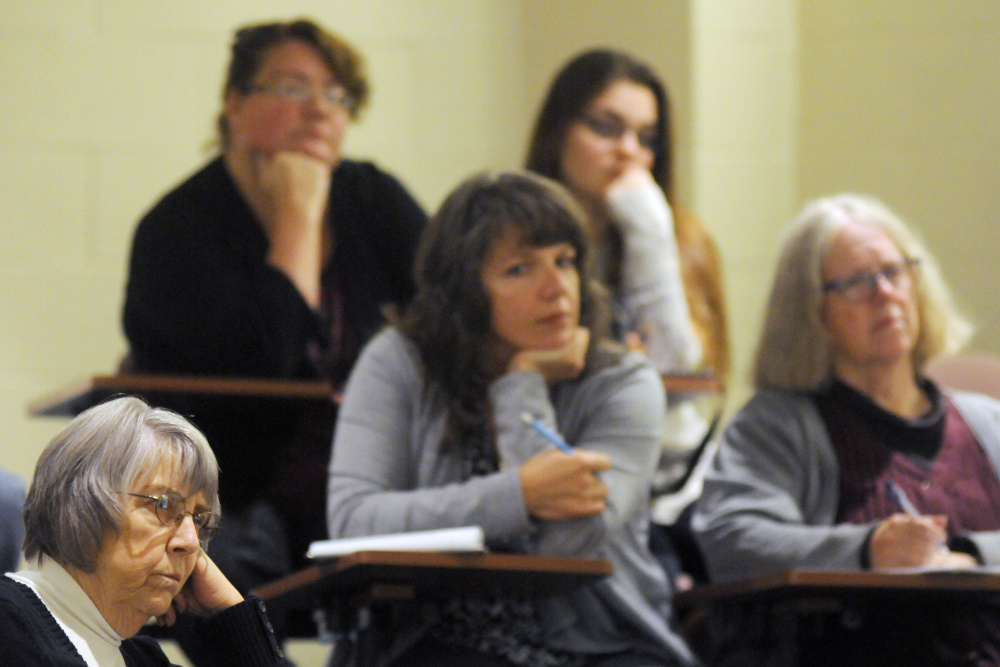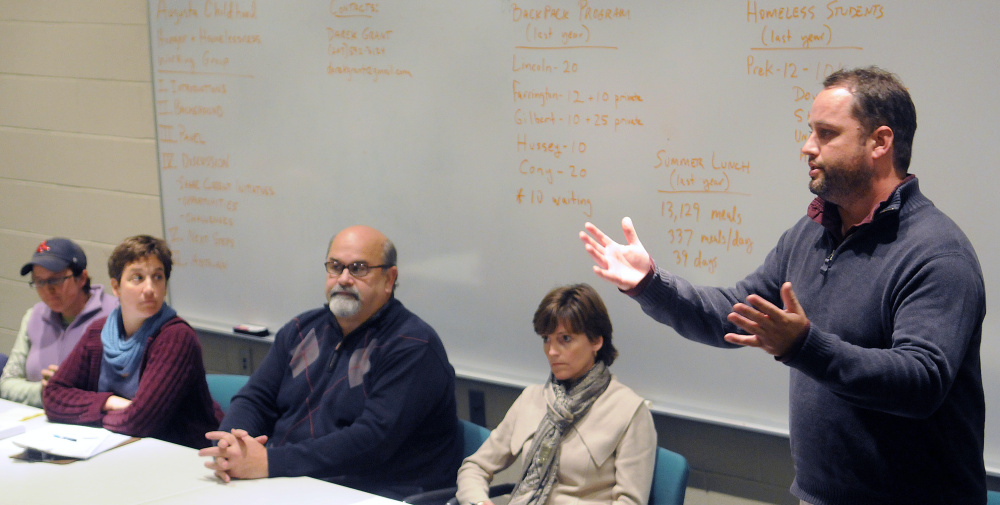AUGUSTA — An increasing number of children are hungry and homeless in Augusta, and about 50 area municipal and school officials, social service workers and others met Tuesday to discuss ways to address the problem.
One question that came up at the community forum was whether children and families who need food and housing are Augusta residents or coming to the city to seek help.
Service providers said it is both and warned against stereotyping those who need help, because they’re just as likely to be your neighbors as someone from away.
“I can tell you, being the person that answers the phone (when people call for help), most of the people are right here in the community,” said school board Chairwoman Kimberly Martin, who works with her church’s food pantry and other programs. “They’re sitting next to you in the pew. People are struggling. They’re losing jobs. There are substance abuse problems. … Yes, some come from away, but many families from here are struggling.”
Abigail Perry, outgoing executive director of the Augusta Food Bank, asked why should it matter where they come from.
Mayor David Rollins, who asked the question, said his point wasn’t that the community shouldn’t help non-city residents – it should. But he’s concerned that the city’s image could suffer if it appears the problem is concentrated in Augusta because of an influx of outsiders who need help.
“The point is the image of the city of Augusta is something we should all be concerned about,” Rollins said. “And the story that goes out should be accurate and clear. I’m not here to promote a false reality. But I get the impression sometimes, when I hear about it and see it in the press, I think we get a bad rap.”
The percentages of Augusta students eligible because of family income to receive free or reduced-price lunches at their respective schools last year were: Cony High School, 52 percent; Farrington Elementary, 60 percent; Hussey Elementary, 52 percent; Lincoln Elementary, 70 percent; and Gilbert Elementary, 65 percent.
At Bread of Life Ministries’ homeless shelter in Augusta, which officials have said is frequently full, more than 60 percent of the people who stay there are families, and 1 of 3 is a child, according to the nonprofit’s website.
Robin Miller, who works for the Family Violence Project’s domestic violence shelter, said the shelter advises domestic violence victims calling from out of state to work with agencies in their own states. She said families are generally better off doing so, in part because they might have family support in their home states. She said the only out-of-state people the shelter accepts are those with ties to Maine.
At-Large City Councilor Dale McCormick said a Maine Women’s Policy Center study 10 years ago found Maine is not a destination for people on welfare.
“They found no, people were not flooding into Maine because welfare policies were liberal,” McCormick said. “They were coming and going at an equal rate, for the same reasons you and I would move in or out of state. Low-income people are just like the rest of us, and they’re moved by the same things.”
According to Theresa Violette, homeless liaison and Title I director for Augusta schools, 101 city students were identified as homeless last year. Of those, 27 lived in a shelter, nine were in a hotel, 15 were unaccompanied by their guardian and 65 were living with other relatives or friends. She said that number has increased every year for the past four.
Superintendent James Anastasio said the number of students not quite meeting federal criteria for being homeless is larger than the number who do. Augusta gets a number of students whose families come to live with relatives after losing housing in their own communities who don’t show up in “homeless” statistics, he said.
In general, he said, students who are hungry and come to school from a less-than-stable home environment struggle to do their best in school, but they face obstacles.
Violette also said she’s seen more students saying on Monday mornings that they are hungry because they hadn’t had a meal over the weekend.
The school system has about 2,300 students.
Ward 2 City Councilor Darek Grant proposed the creation of the working group to seek to address childhood hunger and homelessness. The Augusta City Council unanimously approved the proposal, and its first meeting took place Tuesday at Augusta City Center.
Keith Edwards can be contacted at 621-5647 or at:
kedwards@centralmaine.com
Twitter: kedwardskj
Send questions/comments to the editors.





Success. Please wait for the page to reload. If the page does not reload within 5 seconds, please refresh the page.
Enter your email and password to access comments.
Hi, to comment on stories you must . This profile is in addition to your subscription and website login.
Already have a commenting profile? .
Invalid username/password.
Please check your email to confirm and complete your registration.
Only subscribers are eligible to post comments. Please subscribe or login first for digital access. Here’s why.
Use the form below to reset your password. When you've submitted your account email, we will send an email with a reset code.